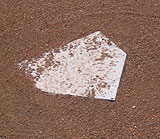It’s not often you see someone trying to steal home — it may be the most rare offensive execution in baseball. But that doesn’t diminish its value, and it certainly brings excitement to the game. Personally, I’d like to see more players attempt to steal home — but, there is a right time and a wrong time to do so.
 This past weekend my team was in a situation where there were two outs, men on second and third, a full count on the batter, and we were up by four runs.
This past weekend my team was in a situation where there were two outs, men on second and third, a full count on the batter, and we were up by four runs.
With the 3-2 pitch on the way, the runner on third broke for home, slid over the batter’s feet, and beat the ball to the plate by a split second. Luckily, it was ball four, so the run counted and the batter was granted first base.
Although successful, it was in every way, shape and form a boneheaded play.
First of all, you never, ever, EVER steal home when there are two strikes on the batter and there are two outs. If that pitch was in the strike zone, the batter would have either swung and decapitated the runner blazing home, or it would have been strike three, the inning ended, and the run would not count. I also don’t advocate stealing home when you’re up by more than a 4-5 runs, because it can be construed as running up the score by your competition — or a lack of faith in the current hitter’s ability to get you home.
So when IS it appropriate to steal home?
Pretty much, any other time than the one described. Generally, you want to steal home whenever the pitcher will allow you and your team is desperate for a run. If it’s a close game, then you must be absolutely, positively sure you can make it, as there are many other, higher-percentage, ways you can score with less than two outs.
Although you could steal when there are two strikes on the batter and less than two outs, it’s a better idea to do it with one strike or less, because you don’t want to take the bat out of the hitter’s hands — and you don’t want a mouth full of wood (or aluminum) if the batter doesn’t realize you’re coming and hacks away.
Which brings up another important point: make sure the batter knows you’re coming! Ideally your team has some kind of signal worked out, be it a sign from the third base coach or something worked out among the players (an audible warning is common, such as calling out the batter’s initials). If you have no predetermined signal, you might want to consider yelling loudly as you approach the plate to ensure the batter does not swing. This may offset the surprise factor, but it’s better to be safe than sorry. On the other hand, it may just cause the catcher to panic and miss the pitch entirely.
In a future post, we’ll describe HOW to steal home.

Leave a Reply